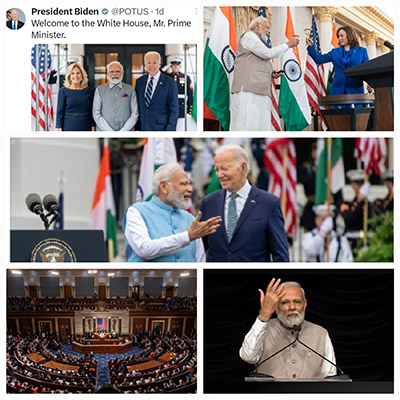Prime Minister Narendra Modi's three-day visit to the United States was marked by a series of significant events and fruitful discussions, reinforcing the strong and expanding India-US partnership.
Both Prime Minister Modi and President Joe Baden acknowledged the historical progress made by past leaders in deepening bilateral ties.
They assured the world community by reaffirming and reasserting their mutual commitments and concerns for a better secure and prosperous world far beyond the realm of trade partnerships.
Addressing the United Congress on Friday in Washington DC, Prime Minister Modi emphasized the need for the current generation to elevate the relationship between the two nations to even greater heights.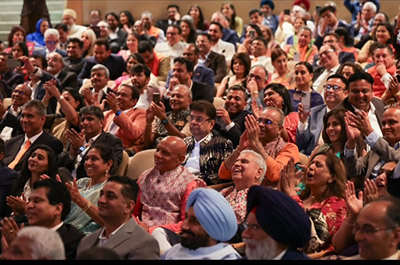
They stressed the importance of honouring this legacy by working together to address crucial issues such as democracy, demography, and shared destiny.
Recognizing the impact of globalization, they pledged to collaborate in diversifying, decentralizing, and democratizing supply chains. Modi got a standing ovation while asserting India's commitment for democracy and world peace and climate change and shared human values.
Emphasizing the role of technology in shaping the future, Prime Minister Modi and President Baden announced the establishment of a new initiative for critical and emerging technology.
Their knowledge partnership aims to seek solutions to global challenges like climate change while promoting security, prosperity, and leadership in the 21st century.
The ongoing conflict in Ukraine was also a focal point of discussions. Both leaders expressed deep concern over the disruptive developments and the suffering caused by the conflict. They emphasized the importance of upholding the principles of the UN Charter, which advocate for peaceful resolution of disputes, respect for sovereignty, and territorial integrity.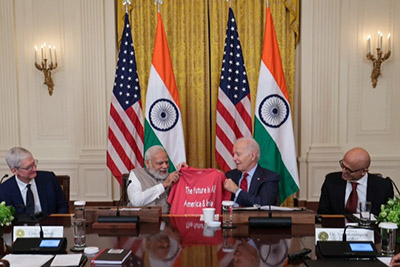
Addressing the pressing issue of terrorism, Prime Minister Modi highlighted the persistent danger posed by radicalism and terrorism to the world. He stressed the necessity of united efforts to combat terrorism, leaving no room for ifs and buts.
Calling for the end of state-sponsored terrorism, he expressed solidarity with all nations affected by acts of terror.
During his visit, Prime Minister Modi also addressed the Indian diaspora, commending their contribution to the growth and development of America. He applauded their dedication and diligence, which received a rousing reception from the Indian community.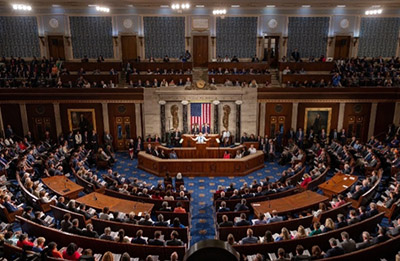
The visit witnessed several agreements, including those on semiconductors, the establishment of a Google AI center, American consulates in Gandhinagar and Bengaluru, and reciprocal visa policies.
The agreements aim to enhance cooperation in various sectors, strengthen economic resilience, and foster innovation and knowledge advancement.
In response to Prime Minister Modi's visit, President Biden and Vice President Kamala Harris expressed their commitment to shaping a future marked by openness, prosperity, security, and resilience. They highlighted the deep connection between the United States and India, rooted in shared values, family ties, and friendships.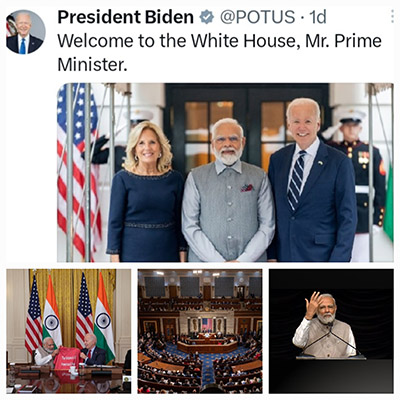
Members of the United States Congress, including Senator Kevin Cramer, welcomed Prime Minister Modi and acknowledged the importance of the India-US partnership. They recognized India as the world's largest democracy, a crucial trading partner, and a vital ally in the face of regional challenges.
Prime Minister Modi's visit to the United States further solidified the India-US partnership, demonstrating collaboration across various domains and a shared commitment to progress and global good. The visit concluded on a positive note, with both nations poised to work together to shape a brighter and better future for all.




